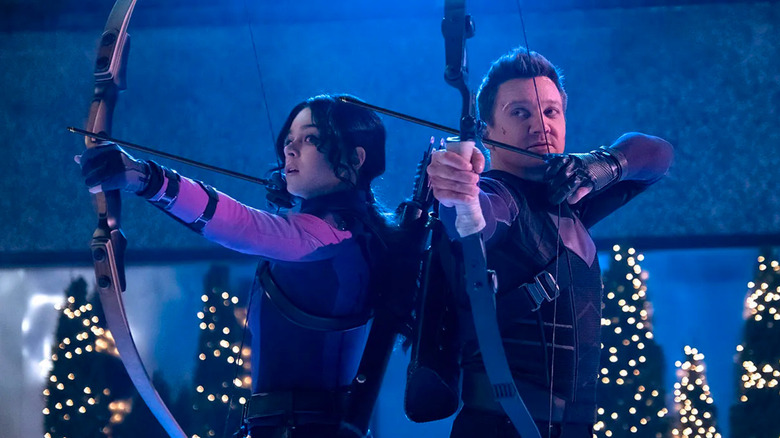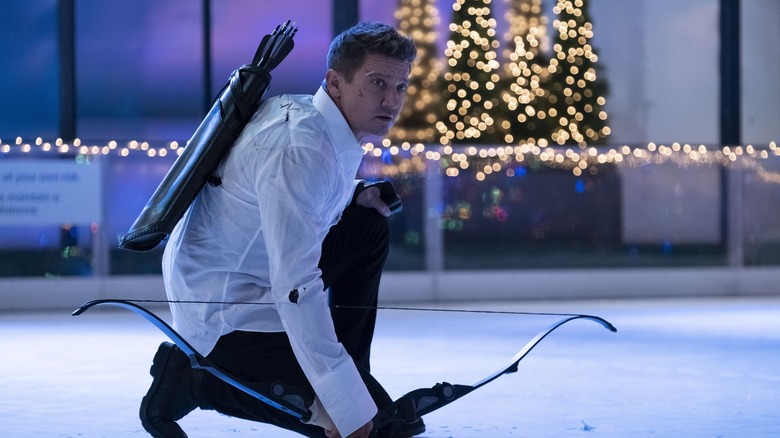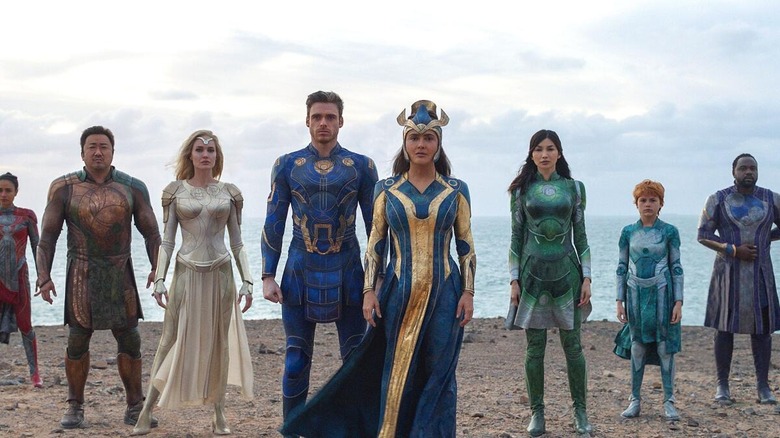Why Hawkeye's Solo MCU Movie Was Scrapped In Favor Of A Disney+ Show
For a lot of MCU fans, and Black Widow fans in particular, one of the most baffling choices the movies have made so far came in "Avengers: Endgame," when Black Widow/Natasha (Scarlett Johannsen) and Hawkeye/Clint (Jeremy Renner) tried to throw themselves off a cliff before the other could do it first. The cliff-jumping part made sense — one of them needed to die to save the world, and it was in character for both of them to sacrifice themself so the other could live. The questionable part was when Natasha successfully stopped Clint and flung herself to her death. It was a sad yet heroic end for her character, sure, but on a meta-level, wouldn't it make more sense for the movie to kill Clint?
No disrespect to Clint of course, but he was the less interesting of the two Avengers. He served his role well and had a heartwarming friendship with Natasha, but he couldn't reliably draw audiences to theaters on his own. Meanwhile, Natasha was a fan favorite, someone who viewers had actively been campaigning for years to get her own standalone movie. It also made the movie's subsequent "girl power" scene, where all the other female supes stand next to each other in a clumsy bit of corporate feminism, even more awkward. It felt weird to celebrate the franchise's female Avengers when the most interesting and groundbreaking one had just been killed off.
The decision started to make more sense when a "Hawkeye" miniseries was announced in 2019, implying that the MCU kept Clint alive because they had exciting, fresh material in store for him. But although "Hawkeye" may have finally let Clint be in the spotlight, it also denied him the movie status so many of the other Avengers got to enjoy.
From the big screen to the small
"We decided to move Hawkeye from the feature side over to the Disney Plus side," Marvel Parliament member Trinh Tran explained in an interview for "MCU: The Reign of Marvel Studios." The idea seemed to be that "Hawkeye" would not only establish Clint as a leading man like Steve Rodgers or Tony Stark, but also establish Kate Bishop (Hailee Steinfeld) as a potential movie-leading hero in her own right. To do this, Marvel believed the story would need more time than a typical movie. As Tran explained:
"We have an Avenger whose backstory we haven't quite had time to explore yet. We also have to introduce a new character [Kate], as well as allow enough time for them to bond and create that special dynamic that everybody finds so appealing in the comics. So, in moving it over, it allowed us six hours, three times as much time, which really gave us the creative flexibility we needed to tell the story."
The result was a mini-series that didn't offend anyone, but didn't wow anyone either. It's been over two years since "So This Is Christmas" aired and we still haven't seen Clint or Kate in any new MCU film (except for "The Marvels," where Kate appears at the very end) or show, and it doesn't sound like either actor expects to be involved in a new MCU project soon. This would be fine if the mini-series stood on its own, but it doesn't; much of its runtime is spent establishing characters like Echo (who would get her own show) and bringing us up to speed on what Yelena's been doing since "Black Widow." What was supposed to be Clint's big moment ended up barely being about him at all.
Sounds like a mix-up, honestly
It's an understandable argument that "Hawkeye" needed to be a mini-series in order to give a fulfilling character arc to both Clint and Kate, but things get a little more complicated when you remember that this show came out the same month as "Eternals." The Chloé Zhao-directed movie had a ton of elements to juggle, including the need to establish ten brand new superheroes in the MCU while giving coherent character arcs to almost all of them.
The movie did an admirable job and successfully managed to avoid being a total disaster, but the whole cast really seemed to be fighting each other for screen time. The result was a movie that was 50% character introductions and expository flashbacks, where certain characters were just straight-up kicked out of the narrative to give everyone else more space.
It's hard not to look at "Hawkeye" and "The Eternals" and wonder if someone switched something up. The latter would've been perfectly suited to a 10-episode miniseries, one where each episode could put the spotlight on an individual Eternal. (What's worse: it almost was a miniseries in the production's earliest stages.) Under-developed characters like Phastos could've been given the full in-depth exploration that the movie clearly wanted him to have. Instead, they're each relegated to about ten minutes of screentime, which feels like a total waste of both the characters and the actors.
Obviously, there were plenty of factors that went into the situation, many of which might never be made public at all, but it's still hard not to think about another universe where Clint got his big-screen debut and the Eternals got the TV show they needed. Maybe the next season of "What If?" will give us a glimpse of it.


